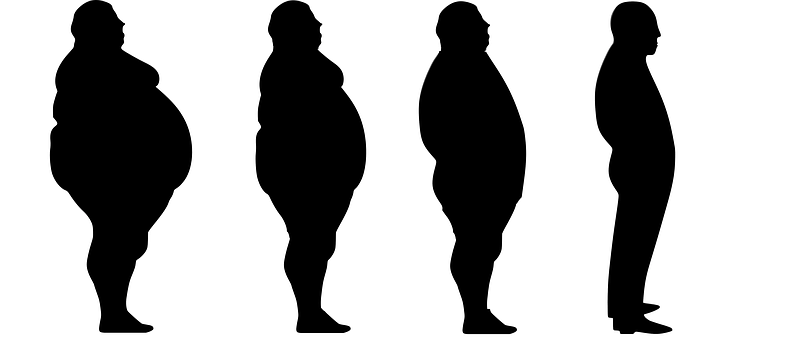
Lose 30 pounds in 30 days! Consume as much as you desire and still shed pounds! Try the thigh buster and lose inches fast!
And so on, and so on. It is not difficult to become stunned by the multitude of items and weight loss philosophies available.
Look over the following legends and verifiable facts in order to eliminate any confusion about shedding pounds, nutrition and exercise.
Myth: Fad diets work for permanent weight loss.
Fad diets are not the ideal method for achieving and maintaining weight loss. Diets that become popular quickly often cause swift weight reduction and claim that you need to eliminate some specific foods from your diet. It is possible to initially shed pounds with one of these diets. Diets that provide extremely limited caloric intake and food selections are difficult to keep up with. Most individuals rapidly become bored with them and eventually put back on any weight that was lost. Fad diets can be detrimental to your health because they might not give your body the full range of vital nutrients it needs. Shedding more than three pounds in a week for a lengthy time could pose the danger of developing gallstones, which are clustered aggregations of solid material in the gallbladder and can be painful. Eating plans that give fewer than 800 calories in a day can lead to abnormal heart rhythms, which can be deadly. Studies indicate that establishing healthy eating habits, moderating portion sizes, and adding exercise to your everyday routine is the most reliable way to shed 1/2 to 2 pounds weekly and maintain the weight loss. By adopting habits that involve good nutrition and regular exercise, you might reduce your odds of getting type 2 diabetes, heart disease, and high blood pressure.
Myth: High-protein or low-carbohydrate diets are a healthy way to lose weight.
It is currently unknown what the long-term impacts on health are of consuming a diet that is high in protein and low in carbohydrates. But having the majority of your calories come from foods which are full of protein like meat, eggs, and cheese is not a way of eating that is beneficial to your health. You could potentially be consuming an excessive amount of fat and cholesterol, which could increase the possibility of having heart disease. It is possible that you are consuming insufficient amounts of fruits, vegetables, and whole grains, which could cause constipation from a shortage of dietary fiber. Eating a lot of protein and little carbohydrates could cause queasiness, fatigue, and lack of strength. Consuming less than 130 grams of carbs each day can bring about the accumulation of ketones in one’s bloodstream. Ketones are partially broken-down fats. A high concentration of ketone bodies circulating in the bloodstream can spark an increase in uric acid amounts, which is a contributing factor to gout (a painful joint disorder) and kidney stones. Pregnant women, persons with diabetes, and individuals with kidney illness might be especially at risk for the effects of ketosis. It is essential to consult with a medical specialist before making any alterations to your eating habits, particularly if you have any kind of medical affliction like cardiovascular sickness, renal illness, or type 2 diabetes.
A good idea is to opt for a diet that is high in protein and low in carbohydrates, since the food choices are limited and it can result in short-term weight reduction due to the decrease in caloric intake. A diet with fewer calories, made up of the right amounts of carbohydrates, proteins, and fat, can help you shed pounds. A balanced diet does not require you to forgo entire food groups like whole grains, fruits, and vegetables—so you do not miss out on the all-important nutrients they have. It can be simpler to persist with an eating regimen or food regimen that has a broad selection of edibles.
Myth: Starches are fattening and should be limited when trying to lose weight.
It is a fact that a lot of foods with a lot of starch, such as bread, rice, pasta, cereals, beans, fruits, and some vegetables (like potatoes and yams) contain little fat and have few calories. A large intake of the food or adding high-fat toppings such as butter, sour cream, or mayonnaise can make it high in fat and calories. Grains that are high in starch, otherwise known as complex carbohydrates, provide your body with a significant amount of energy.
Tip: A healthy eating plan includes the following elements:
- It emphasizes fruits, vegetables, whole grains, and fat-free or low-fat milk and milk products.
- It includes lean meats, poultry, fish, beans, eggs, and nuts.
- It is low in saturated fats, trans fat, cholesterol, salt (sodium), and added sugars.
Myth: Certain foods, like grapefruit, celery, or cabbage soup, can burn fat and make you lose weight.
Fact: No foods can burn fat. Certain foods with caffeine can give a slight boost to your metabolism over a brief period, yet these items will not cause you to lose weight.
An effective way for weight loss is to reduce caloric intake and engage in more physical activity.
Myth: Natural or herbal weight-loss products are safe and effective.
A product marketed as being made from natural or herbal ingredients may not be truly safe for those looking to lose weight. These products rarely go through scientific examination to demonstrate that they are safe or capable of delivering a desired outcome. As one demonstration, herbal supplements containing ephedra, which the United States Government has now outlawed, have caused major medical issues and even fatalities. Products that have been recently released and boast not having ephedra in them may not be completely safe, as they may contain components that are analogous to ephedra.
Suggestion: Consult your medical practitioner before taking any weight-loss supplement. Some natural or herbal weight-loss products can be harmful.
Why Diets Fail
Most diets are successful in helping to achieve a reduction in bodyweight. In the past, when a person regained the weight that was previously lost from dieting, this was considered to be a “failure.” Nutritionists and obesity researchers commonly think that many diets are unsuccessful because they cannot be maintained in the long-term. The tighter the dietary restrictions, the more challenging it will be to follow them, since humans have difficulty handling long stretches of hunger and deprivation. Diets may also be unsuccessful because they don’t educate those attempting to lose weight on how to incorporate new dietary habits that will help them sustain the results. The majority of those who are overweight achieved their additional pounds by eating greater amounts of calories than was necessary for them. Eating a certain way that limits the amount of calories or particular macronutrients such as carbohydrates or fat produces a short term deficiency. Seeing a diet as something that starts and finishes, most people who attempt it will revert to their former dietary orders after it is finished, encurring the consequence of putting back on all the weight lost or even more. Nutritionists and dieticians working with people struggling with weight issues have argued that diets do not fail these individuals, instead those individuals fail to learn how to sustainably eat for prolonged periods in order to avoid regaining the weight lost.
It is not just consumers who think diets are destined for failure – lots of health care specialists and researchers cite the statistic that almost all diets are eventually unsuccessful. According to Albert Stunkard, a director emeritus of the American Obesity Association, this often cited number is from the University of Pennsylvania. In 1959, Stun-kard conducted a study in which he asked 100 overweight participants to diet without offering support or follow-up, and reported that 95% of those individuals failed to stick with the diet.
Improving Long-Term Weight Loss
Recent studies have shown that dieters struggle to keep the weight off, disproving the commonly-held statistic that 95% of diets fail. In the study “Successful Weight Loss Maintenance”, which was published in the Annual Review of Nutrition in July 2001, Rena Wing and James Hill suggested a definition for successful long-term weight reduction as the intentional loss of at least 10% of initial body weight, and maintaining it for at least one year. By using this definition the study revealed positive results for weight-loss goals. Wing and Hill discovered that more than a fifth of obese or overweighed individuals are able to shed at least 10% of their body weight and maintain it for longer than 12 months. An examination of data collected by the National Weight Control Registry uncovered that individuals who were able to preserve a long-term decrease in weight – an average loss of 30kg over 5.5 years – had frequent practices which supported both weight reduction and upkeep. These actions included consuming a low-fat diet, continuously keeping tabs on one’s weight and food intake, and regularly engaging in physical activity. It was proposed by the investigators that maintaining a reduced weight could get simpler with time due to the fact that they observed that once the lost weight had been kept off for two to five years, the chances of continuing to do so were substantially higher.
While Wing and Hill gave brighter assessments of weight loss and maintenance than Stunkard revealed, there is clearly much room for development. A study headed by Robert Jeffery of the Division of Epidemiology at the University of Minnesota’s School of Public Health, and backed by the National Institute of Diabetes and Digestive and Kidney Diseases and National Heart, Lung, and Blood Institute, sought to find approaches that could aid more individuals in effectively sustaining their weight loss (“Long-Term Maintenance of Weight Loss: Current Status,” Health Psychology, vol. 19, no. 1, supplement, January 2000). Jeffery and his team argued that, even though some people are successful at long-term dieting, the high rates of weight loss attempts are not leading to a successful outcome on a larger scale. The investigators theorized that the cause behind the failure to achieve long-term weight loss has not kept pace with the results in short-term weight reduction.
Jeffery, along with Albert Stunkard and other colleagues, uncovered that those undergoing treatment for obesity generally lose weight fast to begin with; however, that advances slowdown over the course of six months, when a maximum amount of weight loss is achieved. Afterwards, the process of putting back on the lost weight starts and keeps going until reaching a point of equilibrium either at or slightly below the original starting weight. The investigators theorized that the behavior modifications suggested could potentially result in weight loss, and failing to stick to these changes could be owed to forgetting what was learned, waning interest, and unwanted reactions like being hungry, distressed, or feeling pressure from society. In the past, scientists would either explain difficulties with maintaining weight as a result of biological factors or as an issue of behavior. Behavioral researchers viewed the process of shedding and regaining weight as a show of just how tough it is to make lasting modifications to factors in the environment which are linked to behavior.
The researchers identified approaches to successfully maintain weight loss for the long-term, such as heightening the potency of the initial treatment, lengthening the duration of the treatment, changing the dietary and exercise elements of the treatment, inspiring the patient and teaching them the key behaviours required for ongoing maintenance. An instance of rigorous weight management treatment is consuming very low-calorie diets (VLCDs). For a period of two to three months, VLCDs limit food intake to 600-800 calories a day, significantly lower than the amount consumed on traditional low-calorie diets, which have a calorie range of 1,000-1,200 calories daily. Very Low-Calorie Diets (VLCDs) typically produce bigger initial declines in weight when compared to regular low-calorie diets. Nevertheless, they have not been successful in achieving permanent weight loss. Weight reductions that come from severe calorie restriction tend to be large and speedy, but then gains tend to become even greater and faster, thus making up for all of the first losses. After being treated for a period of two or more years, individuals given VLCDs (very low-calorie diets) showed no more improvement than those who slimmed down through following less intensive plans.
Dealing with obesity in the same way as other persistent illnesses like diabetes and hypertension that need sustained treatment seems to be useful; nonetheless, going to treatment appointments drops over time and is linked to weight increase. Attempts to change eating and exercise recommendations have concentrated on encouraging people to become more physically active rather than simply altering their diet. Research has uncovered that while certain studies have demonstrated that the combination of exercise and weight loss lead to impressive short-term results, as well as beneficial weight maintenance at eighteen-month follow-up visits, exercise only managed to reduce further weight gain and not prevent it altogether.
Different ways to motivate people have included offering money-based incentives and providing more social assistance. Research has revealed that offering a small reward for weight loss did not increase the amount lost initially, nor did it prevent gaining it all back afterwards. A main focus of strategies to better society-based aid is making sure that spouses or significant others get involved in the weight loss process to learn to give social backing to their partners’ attempts at weight reduction. Strategies such as these have yielded only small results, as do contract-based systems where parties agree to strive to attain a certain amount of individual or collective weight-loss.
Jeffery and his coworkers acknowledged that trying to keep weight in check is both an attraction and an obstacle for those researching the topic, as well as people trying to manage their weight. They recommended that researchers consider additional areas including:
- Considering obesity as a chronic disorder requiring continuous care, with the aim of developing cost-effective methods for delivering care indefinitely
- Examining psychological, behavioral, biological, and environmental factors that relate to weight loss, maintenance of weight loss, and weight regain in order to identify the key factors associated with successful long-term weight loss
- Improving the assessment of energy intake and expenditure and of behavior patterns associated with a change in energy intake and expenditure
- Examining the role of such behavioral preferences as inclination for energy-dense foods and physical activities in obesity and its treatment in an effort to answer such questions as “Can behavioral preferences or reinforcement values be changed in ways that would facilitate long-term weight loss? Do they change spontaneously after behavior changes?”
- Researching why long-term outcomes of behavior treatment for obesity in children and adolescents have been more successful than treatment for obesity in adults
- Learning more about the role of physical activity and social support in relation to long-term weight loss
- Discovering safer and more effective medications to treat obesity and developing new ways to integrate medications into effective programs of weight control.














